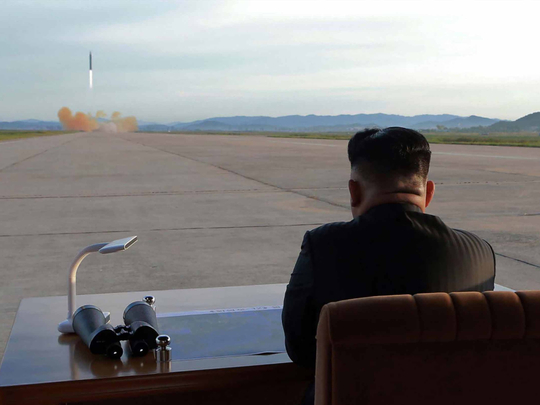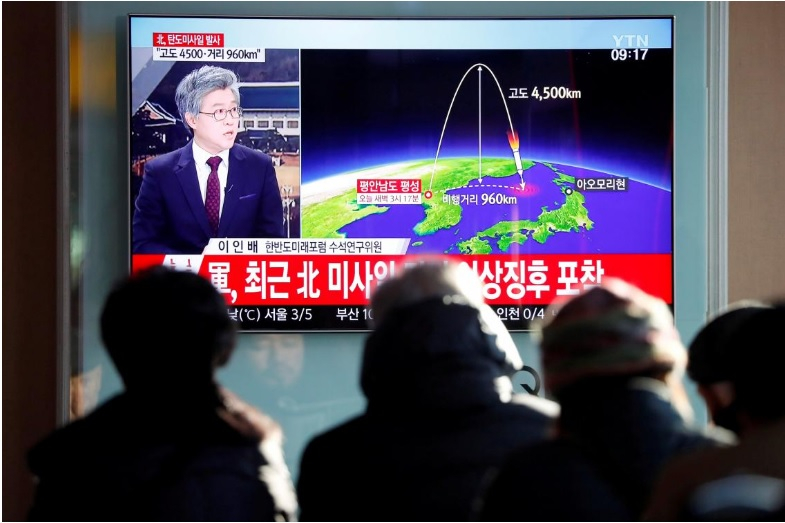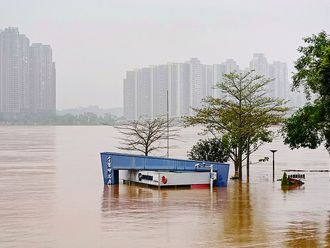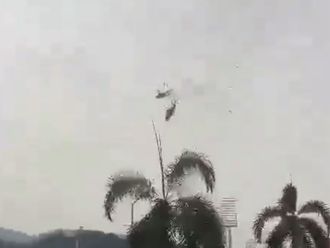
Seoul: Nuclear-armed North Korea said Wednesday it had successfully tested a new intercontinental ballistic missile that put "all of the US continent" within its range.
The North's leader Kim Jong-Un declared the test-launch of the Hwasong-15 missile a success, according to an announcement on state television.
North Korea test fires ICBM in fresh challenge to Trump
— AFP news agency (@AFP) November 28, 2017
https://t.co/Jh9PIJkjvs pic.twitter.com/pdXC3b1udW
Earlier reports said North Korea test fired what appeared to be an intercontinental ballistic missile on Wednesday, in a major challenge to US President Donald Trump after he slapped fresh sanctions on Pyongyang and declared it a state sponsor of terrorism.
It was the nuclear-armed North’s first ballistic test in more than two months and an initial assessment by the Pentagon said it was an ICBM that flew about 1,000 kilometres before splashing down within Japan’s maritime Economic Exclusion Zone.
The test prompted a swift response from Trump who warned: “We will take care of it,” while Japanese Prime Minister Shinzo Abe described it a “violent” act that can “never be tolerated.”
Japan, the United States and South Korea called for a special meeting of the UN Security Council, while US Secretary of State Rex Tillerson stressed that diplomatic options for resolving the North Korean nuclear issue remained “viable and open”
It was the North’s third successful test of an ICBM which has the range to reach the mainland United States, although experts say Pyongyang has yet to master the re-entry technology required to bring a nuclear warhead back through the Earth’s atmosphere.
In September the North conducted its sixth and most powerful nuclear test and staged an intermediate-range missile launch over Japan, before a lull in testing that had raised hopes that multiple sanctions on its nuclear weapons programme were finally having an impact.
The US last week raised pressure on Pyongyang by unveiling new sanctions targeting North Korean shipping.
President Trump also declared North Korea a state sponsor of terrorism, a spot on a US blacklist the country had shed nearly a decade ago.
Trump said that the terror designation and sanctions were part of a series of moves to reinforce his “maximum pressure campaign” against North Korean leader Kim Jong-Un’s regime.
But the North remained defiant, vowing to continue building up its nuclear force in the face of repeated US sanctions and threats.
It condemned the US terror listing as a “serious provocation” and warned that sanctions would never succeed.
It also slammed Washington for behaving like an “international judge on terrorism” and said the move was “clearly an absurdity and a mockery to world peace and security”.
China, the North’s sole ally, has pushed for a “dual track approach” to the crisis which would see the United States freeze its military drills in South Korea while North Korea would halt its weapons programs.
Washington has rejected that approach.
In response to Wednesday’s ICBM test, South Korea’s military staged a “precision strike” missile exercise, the South’s Yonhap news agency quoted military officials as saying.
In a statement, the Pentagon said the missile did not pose a danger to North America, any US territories or any ally nations.
“Our commitment to the defence of our allies, including the Republic of Korea and Japan, in the face of these threats, remains ironclad,” the statement read.
“We remain prepared to defend ourselves and our allies from any attack or provocation.”
Drumming up support for a tough stance against North Korea’s nuclear weapons ambitions was the main focus of a marathon Asian tour undertaken by Trump earlier in November.
But the US administration has said it is still open to pursuing dialogue with Pyongyang and Trump has even said he would be willing, in the right circumstances, to sit down with North Korean leader Kim Jong-Un.













